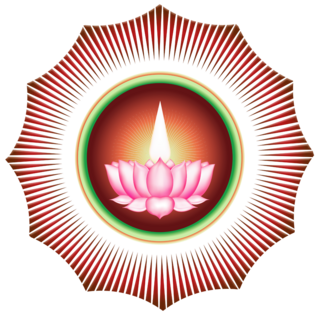
Ayya Vaikundar, also known as Siva Narayana or Vaikunda Swami, was the founder of the Ayyavazhi faith. The Ayyavazhis believe him to be the first and foremost Purna avatar of Eka-Paran and the god Vishnu (Narayana). As per Ayyavazhi mythology detailed in their scriptures, Ayya Vaikundar incarnated in 1833, when he rose from the sea of Tiruchendur in the mortal shell of Vaikundar.

Ayyavazhi is a Hindu denomination that originated in South India during the 19th century.

Akilathirattu Ammanai, also called Thiru Edu, is the main religious text of the Tamil belief system Ayyavazhi. The title is often abbreviated to Akilam or Akilathirattu.

Pathi is the name of the primary centres of congregational worship for the South Indian religious system of Ayyavazhi, having a relatively large structure like that of a temple. They are seven in number.

The Arul Nool is a supplement to the Akilattirattu Ammanai, and is likewise considered a holy scripture of Ayyavazhi. This book contains the collection of messages given by Ayya Vaikundar to his Disciples, whose names are unknown. Since they are believed to be composed by Arylalarkar, it acquired the name Arulnool. There is no direct indication within the book regarding the time of its composition.

The following outline is provided as an overview and topic guide to Ayyavazhi:

Ayyavazhi rituals are the religious practices prevalent among the followers of Ayyavazhi. Most of them are connected with Akilam and Arul Nool and a few, though not associated with the holy books, are practiced for over a century right from the beginning of Ayyavazhi. Some practices are unique for Pathis and some others are common for all worship centres.

Ayyavazhi theology is the theology of a South Indian religious Faith and officially a sect of Hinduism known as Ayyavazhi. Several fundamental theological beliefs distinguish the Ayyavazhi tradition from Hinduism.

The Ayyavazhi includes a corpus of teachings of its initiator Lord Vaikundar in the form of instructions and slogans found in the religious book Akilathirattu.

Payyan dynasty is the family which manage and administer Swamithope pathi, the temple of Ayyavazhi.

The Ayyavazhi symbolism deals with the symbols which are used in or used to represent Ayyavazhi. Though Akilam the scripture of Ayyavazhi does not point out any symbol directly, there are a few symbols which are used for representing Ayyavazhi which came into practice gradually.

Neetham (Tamil:நீதம்) are the primary virtues to be followed according to the Akilathirattu the holy text of Ayyavazhi. They are found in Akilam one, which is the first section of the Akilathirattu Ammanai, and in the middle of the meta-narrative events of the eight yugas. This shows that the society, its people, and the ruling king once lived in absolute harmony with nature, placing the power of God in all their works, deeds, and activities during early ages.

The purpose of this chronology is to give a detailed account of Ayyavazhi from the beginning of the incarnational events of Vaikundar to the present time. Question marks on dates indicate approximate dates. A star (*) indicates the mentioning of that particular date in Akilam or Arul Nool. All dates but a few are found in the Tamil calendar and so doesn't coincide exactly with the months of the Gregorian calendar. The dates may span over any halves of the two consecutive months (Gregorian).

Inclusiveness and exclusivity in Ayyavazhi is the inclusive and exclusive ideology of Ayyavazhi scriptures over other religions. The formula of inclusivism and exclusivism was applied in the religio-cultural universe of Ayyavazhi is one that is not found anywhere else in the world. Though there are separate verses towards inclusivism and exclusivism as central themes in Akilam, the mixture of both is unique. The inclusivistic theory of accepting the views of different religions for a certain period of time and from then onwards exclusivistically rejecting all of them by narrating that all the previous had lost their substances is a mythical as well as religious break-through.

The ethics of Ayyavazhi are found scattered throughout the primary scripture, Akilathirattu Ammanai. They are also integrated with the meta-narrative mythography. However, regarding ethics, Arul Nool is considered as an accumulation and prophecy of the core concepts found in Akilathirattu. In Akilathirattu, the ethical abstracts are pointed out as "told by God" at several places at different situations to lesser god-heads, devas, saints etc. when asked by them.

The Akilattirattu Ammanai and Arul Nool are the scriptures of Ayyavazhi. While Akilathirattu Ammnai is the primary holy text, Arul Nool is considered the secondary regarding the religious importance. The Akilam is further scheduled into seventeen sections and the Arul Nool into eleven.

Ayyavazhi beliefs are those associated with the South Indian religious faith known as Ayyavazhi. Some of the beliefs of Ayyavazhi are shared with that of Hinduism, and others are unique to Ayyavazhi.

The religious studies of Ayyavazhi are based primarily on the Ayyavazhi scriptures. Though there is enough knowledge there for a common worshiper to understand Ayyavazhi theology, it needs the Hindu and at some times the scriptures of other religions to be referred to undergo a detailed religious study on Akilam. Because Akilam maintains a unique type of relation with the other scriptures.
Vivekanandan Version is one among the release versions of Akilam. It was the only version released so far which includes the original source-text as well as the interpretations combainingly. It was named after the publication Vivekananada Pathippakam.
Vaikundar Thirukkudumbam Version (VTV) is one among the released versions of Akilam, the scripture of Ayyavazhi. It was named after the socio-religious welfare organisation Ayya Vaikundar Thirukkudumbam, which released it.


